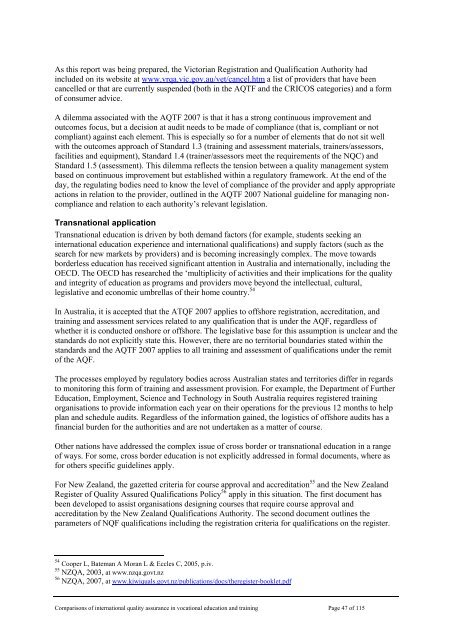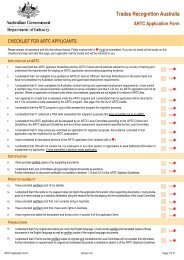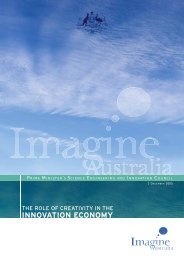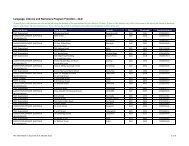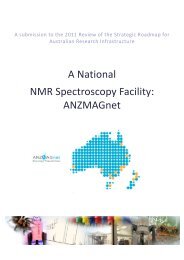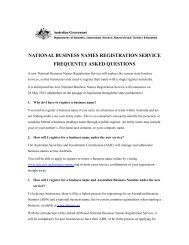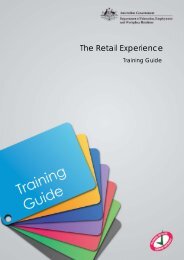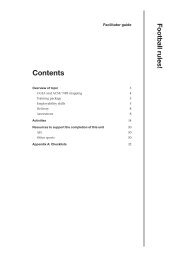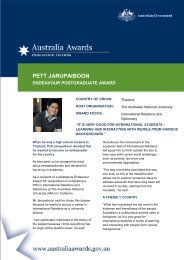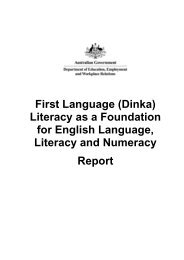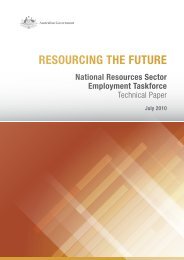Review - Department of Innovation, Industry, Science and Research
Review - Department of Innovation, Industry, Science and Research
Review - Department of Innovation, Industry, Science and Research
Create successful ePaper yourself
Turn your PDF publications into a flip-book with our unique Google optimized e-Paper software.
As this report was being prepared, the Victorian Registration <strong>and</strong> Qualification Authority had<br />
included on its website at www.vrqa.vic.gov.au/vet/cancel.htm a list <strong>of</strong> providers that have been<br />
cancelled or that are currently suspended (both in the AQTF <strong>and</strong> the CRICOS categories) <strong>and</strong> a form<br />
<strong>of</strong> consumer advice.<br />
A dilemma associated with the AQTF 2007 is that it has a strong continuous improvement <strong>and</strong><br />
outcomes focus, but a decision at audit needs to be made <strong>of</strong> compliance (that is, compliant or not<br />
compliant) against each element. This is especially so for a number <strong>of</strong> elements that do not sit well<br />
with the outcomes approach <strong>of</strong> St<strong>and</strong>ard 1.3 (training <strong>and</strong> assessment materials, trainers/assessors,<br />
facilities <strong>and</strong> equipment), St<strong>and</strong>ard 1.4 (trainer/assessors meet the requirements <strong>of</strong> the NQC) <strong>and</strong><br />
St<strong>and</strong>ard 1.5 (assessment). This dilemma reflects the tension between a quality management system<br />
based on continuous improvement but established within a regulatory framework. At the end <strong>of</strong> the<br />
day, the regulating bodies need to know the level <strong>of</strong> compliance <strong>of</strong> the provider <strong>and</strong> apply appropriate<br />
actions in relation to the provider, outlined in the AQTF 2007 National guideline for managing noncompliance<br />
<strong>and</strong> relation to each authority’s relevant legislation.<br />
Transnational application<br />
Transnational education is driven by both dem<strong>and</strong> factors (for example, students seeking an<br />
international education experience <strong>and</strong> international qualifications) <strong>and</strong> supply factors (such as the<br />
search for new markets by providers) <strong>and</strong> is becoming increasingly complex. The move towards<br />
borderless education has received significant attention in Australia <strong>and</strong> internationally, including the<br />
OECD. The OECD has researched the ‘multiplicity <strong>of</strong> activities <strong>and</strong> their implications for the quality<br />
<strong>and</strong> integrity <strong>of</strong> education as programs <strong>and</strong> providers move beyond the intellectual, cultural,<br />
legislative <strong>and</strong> economic umbrellas <strong>of</strong> their home country. 54<br />
In Australia, it is accepted that the ATQF 2007 applies to <strong>of</strong>fshore registration, accreditation, <strong>and</strong><br />
training <strong>and</strong> assessment services related to any qualification that is under the AQF, regardless <strong>of</strong><br />
whether it is conducted onshore or <strong>of</strong>fshore. The legislative base for this assumption is unclear <strong>and</strong> the<br />
st<strong>and</strong>ards do not explicitly state this. However, there are no territorial boundaries stated within the<br />
st<strong>and</strong>ards <strong>and</strong> the AQTF 2007 applies to all training <strong>and</strong> assessment <strong>of</strong> qualifications under the remit<br />
<strong>of</strong> the AQF.<br />
The processes employed by regulatory bodies across Australian states <strong>and</strong> territories differ in regards<br />
to monitoring this form <strong>of</strong> training <strong>and</strong> assessment provision. For example, the <strong>Department</strong> <strong>of</strong> Further<br />
Education, Employment, <strong>Science</strong> <strong>and</strong> Technology in South Australia requires registered training<br />
organisations to provide information each year on their operations for the previous 12 months to help<br />
plan <strong>and</strong> schedule audits. Regardless <strong>of</strong> the information gained, the logistics <strong>of</strong> <strong>of</strong>fshore audits has a<br />
financial burden for the authorities <strong>and</strong> are not undertaken as a matter <strong>of</strong> course.<br />
Other nations have addressed the complex issue <strong>of</strong> cross border or transnational education in a range<br />
<strong>of</strong> ways. For some, cross border education is not explicitly addressed in formal documents, where as<br />
for others specific guidelines apply.<br />
For New Zeal<strong>and</strong>, the gazetted criteria for course approval <strong>and</strong> accreditation 55 <strong>and</strong> the New Zeal<strong>and</strong><br />
Register <strong>of</strong> Quality Assured Qualifications Policy 56 apply in this situation. The first document has<br />
been developed to assist organisations designing courses that require course approval <strong>and</strong><br />
accreditation by the New Zeal<strong>and</strong> Qualifications Authority. The second document outlines the<br />
parameters <strong>of</strong> NQF qualifications including the registration criteria for qualifications on the register.<br />
54 Cooper L, Bateman A Moran L & Eccles C, 2005, p.iv.<br />
55 NZQA, 2003, at www.nzqa.govt.nz<br />
56 NZQA, 2007, at www.kiwiquals.govt.nz/publications/docs/theregister-booklet.pdf<br />
Comparisons <strong>of</strong> international quality assurance in vocational education <strong>and</strong> training Page 47 <strong>of</strong> 115


